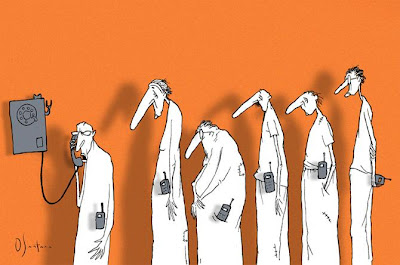 |
| Pirated Computer and Video Games, along with CDs and DVDs are sold "legally" on the streets of Cuba. |
Despite the many
limitations on access to
digital-age technology in
Cuba, a taste for computer games is spreading in this country, giving rise to a youthful movement that is beginning to
conquer new public spaces.
Starting in the 1990s, a small group of mainly young people in this
socialist island nation began to enter the world of
video games. Over time, the number of people involved grew, and they became keen on
face-to-face competitions and meetings, instead of just
virtual interaction.
This gave rise to the nongovernmental
Cuban Electronic Sports Group (ADEC), created in November 2007, which works to "spread the culture and wholesome entertainment" of these types of games,
Ian Pedro Carbonell, the group's president, told IPS.
StarCraft, a strategy game created in 1998 by the
U.S. company
Blizzard, is the best promoted and most popular among the young people who belong to ADEC. Since its launch on the market, it has gained followers worldwide, and in some countries, such as
South Korea, it is considered a "
sport".
It can be played on computers with
minimal technical requirements, although they need to be able to connect to a
network for playing in groups, a more engaging option than a single person playing against the
computer.
"In Cuba,
not everybody has access to this technology," Jessica Sori, one of the few women who have participated in the StarCraft tournaments, told IPS. "As a serious sport, it can only be played by those who don’t have heavy work or study commitments, because it requires a lot of time," explained the young
University of Havana sociology major.
Very few young women compete in the tournaments, more popular among men, which are organised by ADEC at least five times a year for both individuals and teams. Sori said young women are not attracted to this type of game because of a sexist upbringing from an early age.
The Blizzard game, which has spread to all parts of the world in either paid or pirated form, recreates an imaginary universe inhabited by the Terran, Protoss and Zerg civilisations. Each has its own weaknesses and strengths, allowing players to chart their strategies.
To win, players must be familiar with the potential of each civilisation, develop mental agility and know the keyboard commands to execute each action as fast as possible. In addition to StarCraft, the
Cuban group of about 300 members
sponsors games that it considers electronic sports, such as
Warcraft.
With no profit motive, young people, especially university students, organise get-togethers to play in cities like Holguín, Sancti Spíritus, Camagüey and Matanzas. "In other provinces, the electronic sports movement is practically null," Osmani Grau, a computer programmer in the central province of Sancti Spíritus, told IPS.
The scant access to communications via telephone or
cell-phone hinders the enjoyment of this hobby in teams, Grau commented. According to a National Office of Statistics survey of about 38,000 homes conducted in early 2010, only 2.9 percent of Cubans had direct access to the
Internet in 2009.
Nevertheless, the tournaments began a few years ago in private homes. In fact, the first Havana StarCraft League existed before ADEC was established. Later, the Havana Teams League formed, and the idea of going public gradually gained force.
In
Havana, the first gathering in an institutional space took place in 2009, in the
University Student Centre, run by the federation to which all university students belong. For the past year, the
Maxim Rock auditorium in the capital, home to the
Cuban Rock Agency, has accommodated ADEC events.
At the Maxim, as this Cuban temple to
rock music is popularly known, the group adds other expressions of electronic culture to its programme.
Cuban DJs and VJs (music video jockeys) provide the music for the tournaments, which have become more and more frequent.
The main aim of this youthful initiative, however, is to be recognised as an organisation by the National Institute of Sport and Recreation (
INDER), the state entity that regulates this area in Cuba. But "INDER has a complicated financing situation; it is impossible for it to take us on right now," Padrón said.
Talks with INDER led only to an agreement of possible support for locales and infrastructure, said Padrón, a
cybernetics student at the University of Havana. "We asked them to at least recognise this new form of wholesome recreation, and in the future, to validate it as a sport."
If these games are classified as a sport, ADEC could aspire to its own venue, better
technology for other games, and even sending talented Cubans to
international tournaments, Padrón commented. For now, they finance their activities with the support of companies and producers like singer-songwriter
Pablo Milanes’s PM Records.
Informal networks using thick cables running from window to window, or wireless connections with
telecommunications devices such as AP (wireless access points), liven up the
underground, almost
clandestine, world of electronic games in Cuba.
This form of entertainment, which tends to become an addiction, explodes when played over the
web. Cubans have devised creative alternatives, according to a 29-year-old Havana man who asked for anonymity. He told IPS he knows of five wireless networks near his neighbourhood, each of them comprising about 20 people, set up for that purpose. The technology for these connections is not sold in authorised stores. On the
underground market, however, accessible on websites like
Revolico, buyers can find everything from video cards to APs for connecting some 30 computers within the radius covered by the antenna’s signal.
By Dalia Acosta
Source: Caribbean360
Go to Home Page















